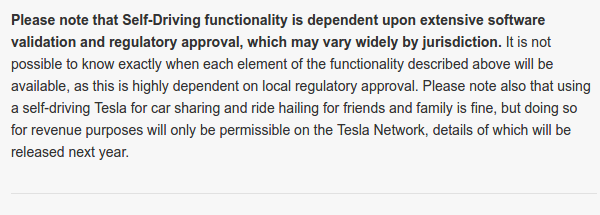On Tuesday, Oct. 25, Future Tense will host an event in Washington, D.C., on how technology is changing the nature of ownership. For more information and to RSVP, visit the New America website.
It’s always in the fine print. When Tesla announced its upcoming models, the company said all of the cars could be used as driverless vehicles—but not, in some circumstances, for Uber-style activities outside of a service Tesla itself plans to announce.
“[U]sing a self-driving Tesla for car sharing and ride hailing for friends and family is fine, but doing so for revenue purposes will only be permissible on the Tesla Network, details of which will be released next year,” the company said on a webpage listing features and terms.

Tesla
Tesla’s warning to future customers was only the latest demonstration of our emerging “you don’t own it, you’re just using it” world. It’s bad enough when we’re restricted in using media, games, and so many other things. It’s more than that when we start applying the notion to fundamental parts of our lives, such as our ability to get where we need to go.
This is why the seemingly unstoppable move toward autonomous vehicles—cars guided and controlled by a networked combination of internal and external sensors and computers—has implications far beyond proponents’ hoo-rah boosterism. Unquestionably, vehicles not controlled directly by humans would be a huge benefit in some ways.
But the word directly is important. Autonomous cars will still be controlled by humans, in a way. They’ll be controlled via algorithms—computer programs written by human computer programmers who design the systems for specific goals and outcomes.
The goals would mostly be laudable: more efficiency in using the roads, leading to lower construction costs; fewer accidents that cause death, injury, and damage to property; better options for people, such as the elderly, who shouldn’t be driving; among other things.
But if Tesla can prevent you from operating your car in a way it finds objectionable from a business standpoint, it—or Ford, GM, Toyota, or any other manufacturer—could make similar choices, choices that go well beyond ride-sharing. Cars controlled by centralized companies—and governments that will regulate them—will be a nightmare for privacy and liberty, especially the latter.
When a small group of large companies sells most of our cars, you can bet they’ll all insist on as much control as possible and as little for you as they can get away with. Even now, cars can be disabled remotely when a borrower falls behind on a car loan; imagine a day when the lender (often the car company) simply brings the vehicle back to the lot and invites the passenger to get out. Worse: We already have an opaque and unfair “no fly” list. Our “no drive” list is, essentially, people who don’t have licenses—an easily extensible notion with autonomous cars. But what happens when there’s a “no travel” list that prevents certain people from even riding in a car? It’s coming.
I admire Elon Musk’s vision and drive (pun intended). With Tesla and, more so, SpaceX, he and his colleagues are pushing us into a future that will take advantage of technology in often-disruptive but also valuable ways.
But Tesla’s upcoming restrictions are a part of the future that we need to prevent. It may be good business for Elon Musk and his shareholders to tell us what we may or may not do with the company’s very expensive cars. In fact, when it comes to how you will use a vehicle you purchase, it should be your business, as long as you’re not breaking the law, and no one else’s.
Read more from Future Tense on how the nature of ownership is changing.
